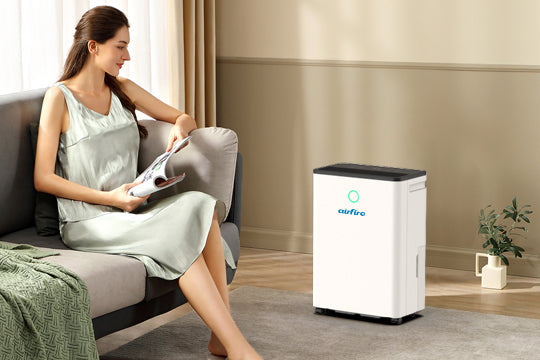
How Humidity Affects Your Sleep (and How to Fix It)
When people talk about a good night’s rest, they often focus on the mattress, pillows, or even the noise level in the room. But one of the most overlooked factors in sleep quality is humidity and sleep quality. The amount of moisture in the air can determine whether you wake up refreshed or exhausted, even if you’ve spent eight hours in bed.

Why Humidity Matters for Sleep
Humidity plays a huge role in how our bodies regulate temperature and how comfortably we breathe at night. If the air is too humid, your body struggles to cool itself, leaving you hot, sticky, and restless. On the other hand, if the air is too dry, your throat, nasal passages, and skin can become irritated, making it harder to drift off or stay asleep.
Experts recommend maintaining indoor humidity between 40–60% for the best balance. Within this range, your body can rest comfortably, your breathing is easier, and your skin won’t suffer from dryness. Unfortunately, many homes don’t naturally maintain this balance—especially in climates with extreme seasonal changes.
The Downside of Too Much Humidity
High humidity often causes that suffocating, muggy feeling. At night, this makes your sheets feel damp, increases sweating, and disrupts your ability to reach deep sleep. Worse, excess moisture can encourage the growth of mold and dust mites, both of which are common triggers for allergies and respiratory problems. If you’ve ever woken up sneezing, coughing, or congested, humidity could be part of the problem.
The Effects of Low Humidity
Low humidity has its own set of challenges. During winter or in arid climates, dry air pulls moisture from your body. This can leave you with a dry throat, cracked lips, itchy skin, and nasal irritation. Breathing dry air at night may also increase the chance of snoring and worsen sleep apnea, leaving you tired the next day.
How to Fix Humidity Problems in Your Bedroom
The first step is to measure your indoor humidity. A simple digital hygrometer can give you real-time readings so you’ll know whether your room is within the 40–60% ideal range.
For rooms with high humidity, an air dehumidifier can make a dramatic difference. AIRFIRE dehumidifiers are designed to quietly and efficiently reduce excess moisture, creating a more comfortable environment without disrupting your rest. With ultra-quiet sleep mode, they operate at night without disturbing your slumber.
If your problem is low humidity, you can balance it with a high-quality humidifier to add moisture back into the air. Some people even use an air purifier with a fragrance pad to combine clean air with a calming aroma, which promotes deeper, more restful sleep.
Bonus Tip: Pair Humidity Control with Fresh Air
For the best results, combine a dehumidifier with an air purifier. Controlling both moisture and airborne particles ensures you’re not only sleeping in the right humidity but also breathing clean, allergen-free air. Adding a few drops of essential oil to AIRFIRE’s aromatherapy pad can also create a soothing environment that makes it easier to relax and fall asleep.
Final Thoughts
Your sleep routine may already include blackout curtains, soft sheets, or a sound machine, but if you overlook air quality and humidity, you might still wake up tired. By controlling humidity and sleep quality, you can transform your bedroom into the perfect environment for rest. With solutions like AIRFIRE dehumidifiers and purifiers, every night becomes an opportunity to recharge and every morning a chance to wake up refreshed.
